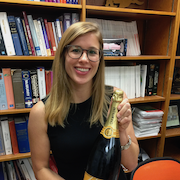
Megan Hill is a postdoctoral researcher in the Johnson lab at MIT. Prior to MIT, Megan did her undergraduate work at California Polytechnic State University in San Luis Obispo, and then received her PhD from the University of Florida. Throughout her scientific career, Megan has been intrigued by novel chemical materials, and in particular how minute changes in chemical bonds or interactions can induce drastic changes in material properties. In her current research, Megan is taking advantage of the high Lewis acidity of boron to make boron-based polymers to 1) form dynamic supramolecular networks and 2) develop polymer-based electrolytes for lithium ion batteries.
Megan’s journey to becoming a chemist started in late high school when applying to colleges. Her reasoning for becoming a chemist at the time might have been a little silly, saying, “When I was applying to college, I honestly just thought that I could get into more colleges if I picked a major like chemistry.” However, in her first year of college, a magnificent general chemistry professor got her hooked on the subject. He even made Megan enjoy exams by framing them as “experiences,” using them as a way to challenge his students rather than testing them. Chemistry is indeed challenging, but the attitude Megan learned in this class has stuck with her throughout her career. “Every step along the way, I assumed I would quit,” says Megan, “But something about [chemistry] just keeps pulling me in. I keep having fun and despite there being a lot of stuff I don’t fully understand, the moment you figure something out is really rewarding.”
During undergraduate, a slew of formative research experiences set her on the path to graduate school. When looking for a research adviser, Megan says, “I really just walked down the hall of professors’ offices and knocked on their doors until I finally found a professor willing to offer me an opportunity.” She ended up in the lab of Philip Costanzo, a polymer synthesis lab. Professor Costanzo was able to leverage his research connections to help Megan find research opportunities around the globe, first in Uppsala, Sweden with Jöns Hilborn and then with Brent Sumerlin, who was then at Southern Methodist University. Speaking of her experience in the Sumerlin lab, Megan says, “I loved that experience so much that in that moment I made the decision to go to grad school and I just decided to join his group, which was moving to University of Florida.”
After undergraduate, Megan never stopped travelling: during her PhD she worked in France for six months and then did a short post-doc in Japan at University of Tokyo. Of her many research experiences, Megan’s time in Japan helped her identify what she values not just as a scientist but as a person, saying, “During my time in Tokyo I realized how much I value a genuine work-life balance and how much the culture of where you live influences your happiness.” The hierarchical and often sexist culture she experienced as a female scientist in Tokyo had largely jaded her against continuing in science; however, the positivity and collegiality she sensed during her interview with the Johnson group convinced her to give her post-doc a second shot.
At MIT, Megan has been an active and engaged member of both the Johnson lab and the chemistry department at large. WIC+ in particular has helped her settle into her role as a leader in her lab, giving her the tools to build a positive and inclusive work environment. “The WIC+ community is a safe space to have meaningful and honest conversations about rarely spoken topics,” says Megan. “Being a part of these conversations has given me the confidence to speak up and as a PostDoc I feel more responsibility to do so and to define the culture.”
Looking towards the future, Megan is currently applying to faculty jobs. Just like Megan values inclusivity, work-life balance, and collegiality in her own life, she’s looking for a department that shares those same values, saying, “I would love to find a department that will really cheer for the success of their faculty.”
But before she leaves us here at MIT for greener pastures, she has some sage words of advice for younger trainees: “The most important thing to me was finding mentors who were very supportive and encouraging. Second, find a mentor who wants to help you identify what your goals are and help you achieve those goals. Third, look for a mentor that values mentoring and focuses on your development as a human being, not only as a scientist.”
